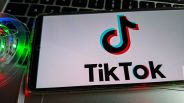Gregg Spiridellis took a phone call in January that could radically change the future of his company, JibJab. Two months later, he was sitting in the Fort Mason Center in San Francisco, watching Mark Zuckerberg demonstrate his product onstage at the F8 developer conference.
Zuckerberg was introducing the new Facebook Messenger service, which allows users to seamlessly insert GIFs and stickers into their messages via external apps. To showcase the new tool, he sent a message that included a personalized JibJab GIF portraying Zuckerberg as a rock guitar player.
Spiridellis told Tech Times that the guitar GIF is his new favorite.
"Now that one's got a special place in my heart", he said.
It's hardly surprising, given the potential benefits for JibJab, which started out creating satirical political cartoons 15 years ago. What might surprise you is that Spiridellis wasn't surprised by the January phone call from Facebook and sees the journey from satirical cartoonists to technologists as a natural progression.
Gregg started JibJab in his Brooklyn apartment with his brother Evan in 1999. They started creating satirical political cartoons and sharing them online. They garnered nationwide attention with the "This Land" video, which went viral and even landed them a spot on Jay Leno's Tonight Show.
As they saw the Web becoming more social, JibJab pivoted to creating personalized comedy e-cards that people could share. That was when the relationship with Facebook began.
"In the early 2000s, we created political satire which was primarily distributed by email and then when Facebook launched their Web platform in 2007, we were pioneering viral distribution in newsfeed with e-cards," said Spiridellis. "Now we see messaging as the third wave of distribution."
ⓒ 2025 TECHTIMES.com All rights reserved. Do not reproduce without permission.




